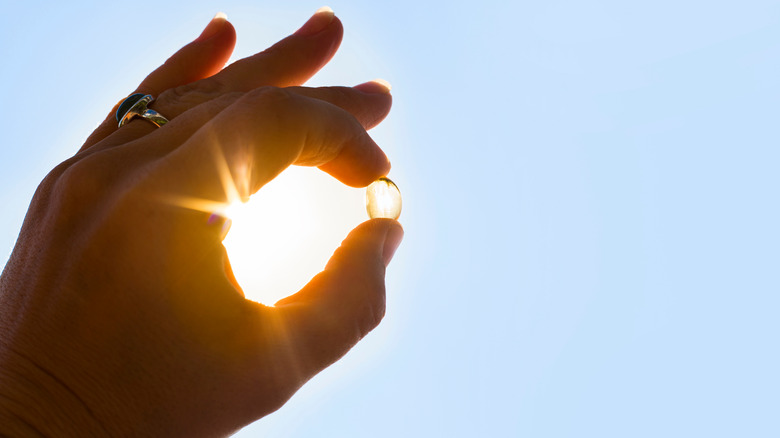A Surprising Vitamin Might Reduce Colon Cancer Risk
Cancer is one of the scariest diagnoses a person can receive. Survival rates often depend on the location and stage of the cancer as well as the type of treatment and recovery a patient can afford. It's just one more reason people will make astounding changes to reduce their cancer risk.
Big changes can be good but they can also be stressful. New research from the University of California San Diego points to one small change that may dramatically lower one's risk for colon cancer, particularly in older individuals (via BMC Public Health).
Although it is not often openly discussed, colon cancer is the second most common cancer for women and the third most common for men, according to the World Cancer Research Fund. Roughly 1.8 million new cases were reported worldwide in 2018 alone, highlighting just how common this cancer is for all.
Many factors can affect a person's risk for colon cancer. Having an inflammatory bowel disease like Crohn's or a family history of colon cancer are strong potential indicators, per the Centers for Disease Control and Prevention (CDC). But lifestyle factors can also affect a person's risk level. While some of these factors require intense change, researchers at the University of California San Diego found one lifestyle change that people may adapt to much more easily than others.
Soak up the sun to reduce your risk for colon cancer
Researchers published their findings on July 4, 2021 in BMC Public Health, revealing a connection between vitamin D intake and a person's colon cancer risk level. One of the authors of the study, Raphael R. Cuomo, Ph.D., stressed that while their findings were promising, they were also preliminary. This means that more research is still needed but that this new study offers a strong foundation.
The study found that countries with more sunlight exposure had lower rates of colon cancer once factors like skin pigmentation, age, and life expectancy were taken into account according to the American Association for the Advancement of Science (AAAS). The study also took certain lifestyle factors into account as well.
According to the CDC, smoking, lack of physical activity, and a poor diet high in processed meat can all contribute to a high risk of colon cancer. Other dietary factors include foods with low-fiber content and high rates of alcohol usage.
Changing all of these lifestyle markers is not easy. But as this new study points out, getting outside and under the sun might have just as big an impact. The AAAS reports that colon cancer risk dropped most significantly in people over 45 years of age, so long as they were regularly exposed to UVB radiation from the sun, stimulating the body's development of vitamin D. More research is still needed, but for now, this seems like a good enough reason to go for a walk on a sunny day to up your vitamin D intake.


